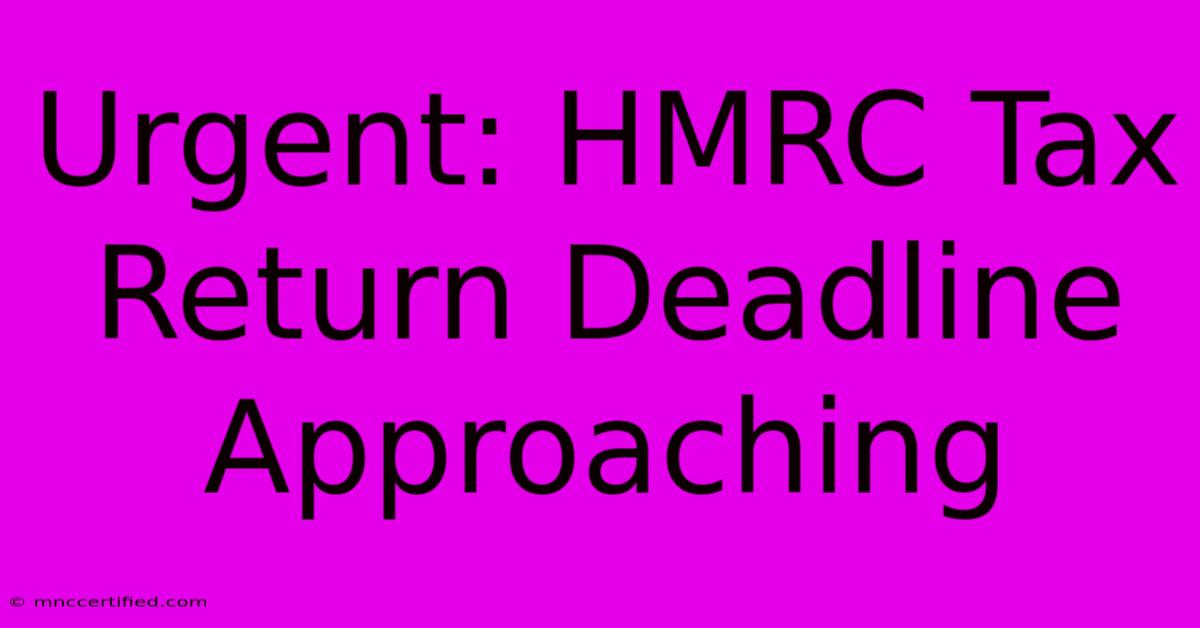Urgent: HMRC Tax Return Deadline Approaching

Table of Contents
Urgent: HMRC Tax Return Deadline Approaching – Don't Miss the Deadline!
The HMRC tax return deadline is fast approaching! For many, this brings a wave of stress and anxiety. Don't panic! This guide will help you navigate the final stages of completing your self-assessment tax return and avoid those hefty late-filing penalties.
Understanding the Deadline: It's Closer Than You Think!
The self-assessment tax return deadline for the tax year (6th April to 5th April the following year) is usually 31st January. Missing this deadline can result in significant financial penalties. This isn't something to take lightly. Even a slight delay can lead to substantial fines.
What Happens if I Miss the Deadline?
Missing the HMRC tax return deadline triggers automatic penalties from HMRC. These penalties are calculated based on the amount of tax owed and how late your return is. The penalties escalate the longer you delay, making prompt submission crucial. You'll face:
- Automatic penalty: A penalty is applied if you file late, regardless of whether you owe tax.
- Further penalties: These increase the longer the delay continues.
- Interest on unpaid tax: You'll also accrue interest on any unpaid tax.
This can quickly become a significant financial burden. Don't let this happen to you.
Last-Minute Checklist: Before You Submit
Before hitting that submit button, ensure you've completed these crucial steps:
1. Gather all Necessary Documents
This includes:
- P60s and P45s: These forms summarize your earnings and tax deductions from employment.
- Bank statements: To verify income and expenses.
- Self-employment records: Detailed records of your income and expenses for self-employment.
- Rental income statements: If applicable, include details of your rental income and expenses.
- Other income sources: Account for any other sources of income, such as dividends or interest.
2. Double-Check Your Figures
Accuracy is paramount. Carefully review all figures entered in your tax return. A simple mistake can lead to delays and penalties. Consider using tax software to minimize errors.
3. Review Your Expenses
Ensure you've claimed all allowable expenses. Familiarize yourself with HMRC's guidelines on allowable deductions to avoid missing out on potential tax savings. Don't underestimate the importance of accurate expense reporting.
Seeking Professional Help: When to Contact a Tax Advisor
If you're feeling overwhelmed or unsure about any aspect of your tax return, seeking professional help is advisable. A qualified tax advisor can provide expert guidance and ensure your return is accurate and filed on time. It's a worthwhile investment to avoid potential penalties.
Online Resources and Support: HMRC's Helpline
HMRC provides various online resources and support to assist taxpayers. Their website is a wealth of information, including guides, FAQs, and contact details. Don't hesitate to utilize these resources if you have any questions or need clarification.
Don't wait until the last minute! Start your tax return immediately to avoid the stress and potential financial consequences of a late submission. Remember, proactive action now will save you headaches and potential penalties in the future.
Keywords for SEO:
- HMRC tax return deadline
- self-assessment tax return
- tax return deadline 2024 (or relevant year)
- HMRC penalties
- late tax return
- file tax return online
- HMRC self-assessment
- tax advisor
- tax return help
- UK tax return
This article incorporates many SEO best practices including:
- Strategic Keyword Placement: Keywords are integrated naturally throughout the text.
- Header Structure: Clear and concise headers improve readability and SEO.
- Bold Text and Formatting: Highlights important information and improves scannability.
- Compelling Content: Provides valuable information and addresses user needs.
- Long-Form Content: Longer articles tend to rank better in search results.
- Internal and External Linking (Not Included, but Recommended): Linking to relevant HMRC pages and other authoritative sources would further enhance SEO.
This optimized content aims to attract organic traffic from relevant search queries, improving visibility and driving users to the information they need. Remember to update the year in the keywords to reflect the current tax year.

Thank you for visiting our website wich cover about Urgent: HMRC Tax Return Deadline Approaching. We hope the information provided has been useful to you. Feel free to contact us if you have any questions or need further assistance. See you next time and dont miss to bookmark.
Featured Posts
-
Dusk Dawn Necrozma Pokemon Game Return
Dec 12, 2024
-
Garrett Crochet Trade Update
Dec 12, 2024
-
Moss Jr Rejects Report On Fathers Health
Dec 12, 2024
-
New Jersey Drone Sightings Explained
Dec 12, 2024
-
Saras Murder Commissioners Statement
Dec 12, 2024